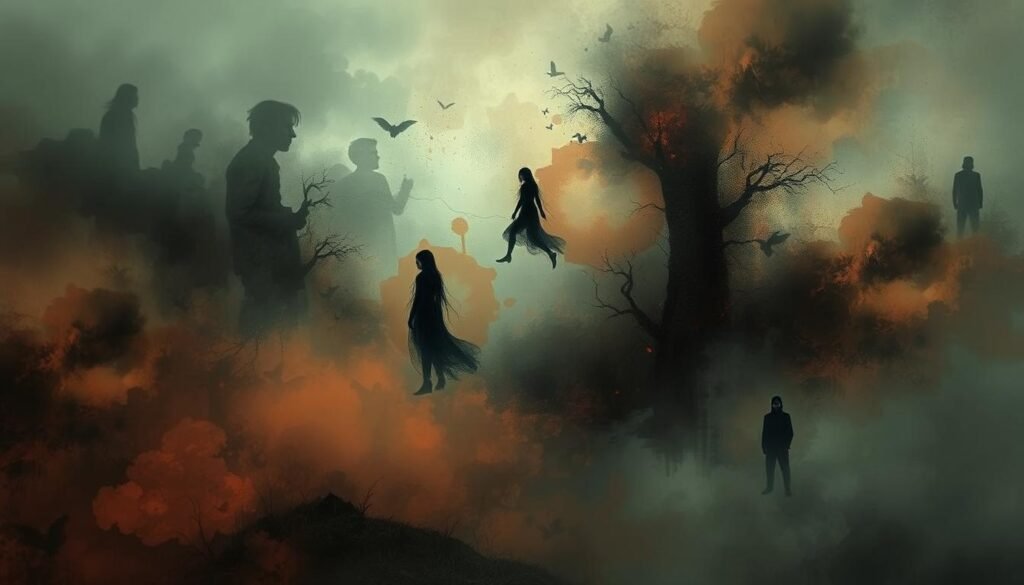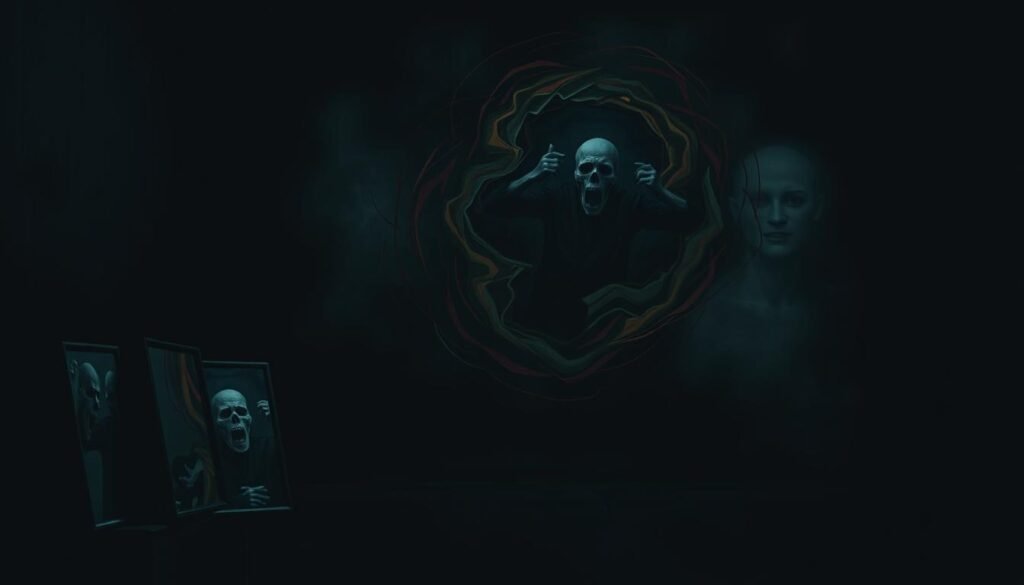About 20% of people with severe depression have hallucinations and delusions. This fact points to a deep link between mood disorders and psychosis, called psychotic depression. Recognizing psychotic depression is important. It combines severe depressive symptoms and psychotic features. This mix deeply affects a person’s grasp on reality.
People dealing with this condition often feel very sad and hopeless. They lose interest in simple pleasures. Going about daily tasks can become incredibly hard for them. The addition of psychotic symptoms makes things even tougher. These can be auditory or visual hallucinations—seeing or hearing things that aren’t there. Or false beliefs, known as delusions. This loss of touch with reality is key to psychotic depression. It shows why understanding these signs is necessary for spotting and treating the condition.
Key Takeaways
- Psychotic depression integrates severe depressive symptoms with hallucinations and delusions.
- A significant number of individuals with severe depression experience psychotic symptoms.
- These symptoms can severely disrupt daily life and functioning.
- Understandings of hallucinations and delusions are vital for effective treatment.
- Prompt and comprehensive medical care is crucial for those diagnosed with psychotic depression.
What is Psychotic Depression?
Psychotic depression is serious. It’s major depression mixed with psychotic symptoms. This hurts a person’s ability to do daily tasks. About one in four people going to the hospital for depression have psychotic depression. They often feel disconnected from reality, seeing or believing things that are not true.
Treating psychotic depression quickly is very important. Without help, individuals may often feel very low or even think about suicide. About 10 to 19 percent of those with major depression can have psychotic symptoms. This number goes up to 25 to 45 percent in hospitals.
People usually first experience it between 20 and 40 years old. It’s more intense than other types of depression. It often includes very sad thoughts and a higher risk of thinking about self-harm. Knowing about these serious aspects is key to helping.
Lifestyle changes are crucial for handling psychotic depression. Eating right and exercising can improve mental health. It’s important to learn about self-care habits that make a difference. Knowing about psychotic depression helps in finding the best treatment and support.
Symptoms of Psychotic Depression
Psychotic depression involves a variety of symptoms. They can vary in how strong they are and how long they last. Knowing these symptoms is important for recognizing and treating the illness. People with psychotic depression may show emotional, behavioral, and physical signs. These signs can disrupt their everyday life.
Common Symptoms
Some of the Common Symptoms of psychotic depression include:
- Persistent sadness and hopelessness
- Fatigue and a loss of energy
- Feelings of worthlessness or guilt
- Disrupted sleep patterns
- Changes in appetite
- An inability to concentrate
- Thoughts of death or suicide
These Psychotic Depression Symptoms can greatly impact a person’s daily life and happiness. Spotting these signs helps loved ones and doctors spot psychotic depression.
Psychotic Symptoms: Hallucinations and Delusions
This part is about specific psychotic symptoms in psychotic depression. We’re looking at Hallucinations in Depression and Delusions in Depression. People might hear voices or see things that aren’t there. This can make feelings of guilt or worthlessness worse. Delusions often involve false beliefs. For example, thinking you’ve done something terribly wrong or believing others are against you.
Both hallucinations and delusions match the sad mood of depression. This makes them very important for diagnosing and treating the illness.
Hallucinations and Delusions in Psychotic Depression
Those with psychotic depression face tough challenges from hallucinations and delusions. Learning about these symptoms helps us see their effect on personal experiences and depression overall.
Understanding Hallucinations
People with depression might see or hear things that aren’t there. Many hear voices criticizing them, which makes them feel worthless and alone. These hallucinations in depression reveal how much emotional pain someone is in.
Understanding Delusions
Delusions make people with depression believe things that aren’t true. They might feel guilty, like a failure, or that someone is out to get them. Knowing about delusions in depression is key because it can make seeking help harder. These beliefs show their struggle and make finding the right treatment complicated.
The Connection to Depression
The link between psychotic symptoms and deep sadness needs careful study. Research shows hallucinations and delusions often come from emotional distress in depression. This shows why treatments must tackle both symptoms and the depression itself. Knowing how these are connected is crucial for creating effective help.

| Type of Psychotic Symptom | Examples | Impact on Depression |
|---|---|---|
| Hallucinations | Hearing critical voices, seeing threatening figures | Heightened feelings of despair and hopelessness |
| Delusions | Nihilistic beliefs, paranoia about external threats | Distortion of reality, complicating treatment efforts |
| Mood-Congruent Hallucinations | Voices detailing failures or guilt | Reinforces depressive themes |
| Mood-Incongruent Hallucinations | Voices unrelated to emotional state | Associated with poorer prognosis |
Causes of Psychotic Depression
The development of psychotic depression involves many factors. They combine to create a complex picture. To understand the Causes of Psychotic Depression, it’s important to look closely at genetics and life events. Both are key in triggering this serious health issue.
Genetic Factors
Studies highlight a strong hereditary link in the Causes of Psychotic Depression. Severe depression often appears in families. If you have family members with depression or psychotic disorders, your risk is higher. About 10 to 15% of people with severe unipolar depression may show psychotic symptoms. This shows genetic factors play a big role.
Life Events and Personal Circumstances
Life events strongly affect one’s mental health, especially with psychotic depression. Traumas like losing someone close, breakups, and money issues can lead to severe depression with psychosis. Bad times during childhood also matter a lot. They make depression more likely later on. Thus, life situations mix with genetic risk, showing the complexity of the Causes of Psychotic Depression.
| Factor | Description |
|---|---|
| Genetic Predisposition | Higher likelihood if there is a family history of depression or psychotic disorders. |
| Childhood Trauma | Adverse experiences in early life that increase susceptibility to depression. |
| Major Life Events | Stressful incidents such as loss, financial issues, or relationship problems can trigger symptoms. |

To fully understand and support someone with Causes of Psychotic Depression, it’s crucial to look at both genetics and environment. Mental health experts say this approach helps in treating this complex condition more effectively.
Diagnosis of Psychotic Depression
To diagnose psychotic depression, doctors look closely at symptoms through interviews and forms. They use DSM-5 criteria for this. A person must have five or more depression symptoms for 14 days or more. This helps in understanding the mix of depression and psychosis, leading to Diagnosis of Psychotic Depression. It’s key for coming up with timely treatment plans.
Diagnostic Criteria
Diagnosing this condition goes beyond just watching signs appear. The criteria help doctors tell psychotic depression from other mood issues. They carefully watch for hallucinations, delusions, and mood signs. This focus helps catch any chance of the condition coming back. Keeping detailed records and regular check-ups are crucial for Psychotic Depression Treatment.
Role of Healthcare Providers
Psychiatrists and psychologists are key in treating this depression. They do important evaluations and tests to rule out other health problems. Gaining insights from these experts leads to custom Psychotic Depression Treatment. Treatment might combine medicines like venlafaxine with therapies such as Electroconvulsive Therapy (ECT). Despite some side effects, this in-depth diagnosis and treatment improve recovery chances.

| Components | Details |
|---|---|
| Diagnostic Criteria | Five or more depressive symptoms for at least two weeks. |
| Role of Healthcare Providers | Conduct evaluations, administer tests, recommend treatment plans. |
| Common Treatment Medications | Venlafaxine, Quetiapine, Sertraline, Olanzapine, Fluoxetine, Amitriptyline. |
| Specialized Therapy | Electroconvulsive Therapy, Acceptance and Commitment Therapy. |
| Relapse Rate | Higher in psychotic depression compared to non-psychotic depression. |
Treatment Options for Psychotic Depression
Treatment for psychotic depression involves a mix of strategies. This often includes medication, Cognitive Behavioral Therapy (CBT), and sometimes Electroconvulsive Therapy (ECT). Understanding these options can help people and their families look for recovery.
Medication Approaches
Medication is key in treating Psychotic Depression. The best results often come from combining antidepressants with antipsychotics. For example, mixing sertraline, an SSRI, with olanzapine, an atypical antipsychotic, helps many patients improve. A big study showed this combo works well for both young and older adults. Still, only a few patients in the U.S. get this effective mix of meds, even when doctors suggest it.
Cognitive Behavioral Therapy
Cognitive Behavioral Therapy (CBT) is crucial for healing. CBT aims to fix harmful thinking patterns. This helps people handle their depressive and psychotic symptoms better. By learning coping skills and emotional regulation, CBT becomes a strong part of the treatment plan.
Electroconvulsive Therapy (ECT)
ECT is an option when other treatments don’t work. It’s often used for severe depression with psychosis. ECT can reduce extreme symptoms when nothing else helps. The National Institute of Mental Health is studying how to use antipsychotics more effectively after ECT.
Managing Psychotic Symptoms
It’s really important to handle psychotic symptoms well if you’re dealing with psychotic depression. Creating strategies for coping can make a big difference. Techniques like being mindful, grounding exercises, and meditating help stabilize emotions. Knowing the early signs of these symptoms helps manage them better, improving the overall situation.
Strategies for Coping
There are many ways to cope with psychotic symptoms. Here are a few:
- Practicing mindfulness to stay in the present.
- Doing grounding exercises to connect with your senses.
- Keeping a regular schedule for normalcy.
- Writing in a journal to process feelings and thoughts.
- Getting professional help for more support.
Using these methods can help in managing psychotic symptoms and reducing their impact.
The Importance of Social Support
Social support is key in managing psychotic symptoms. Family, friends, and support groups give both emotional and practical help. This encourages recovery and getting the right help.
Talking with others reduces feeling alone and increases belonging. For people facing psychotic depression, having understanding loved ones is crucial. They can help greatly by just knowing about the condition. For more information, check out this resource on dealing with psychotic symptoms.
Risks and Considerations
Understanding the risks of psychotic depression is crucial for everyone involved. The main concern is the high risk of suicide. Those affected may feel deep despair. It is important to notice warning signs early and help right away.
Suicide Risk
Studies show people with psychotic depression have a higher suicide risk. Around three in 100 people will have psychosis in their lives. Delusions and hallucinations can make hopelessness worse. Knowing the warning signs is key. These include:
- Feeling worthless or hopeless
- Talking about wanting to die or being a burden to others
- Using more drugs or alcohol to cope
- Pulling away from friends, family, and normal activities
- Showing extreme mood changes or unpredictable behavior
If someone shows these signs, they need support right away. If someone is thinking about suicide, calling a crisis service like the 988 Lifeline is crucial. They offer help and advice.
When to Seek Help
Knowing when to get help is important for dealing with psychotic depression. Look out for these signs:
- Constant thoughts of hurting oneself or suicide
- Big mood changes, including very bad irritability
- Struggling with daily tasks, like work or self-care
- Delusions or hallucinations that make reality confusing
- Getting much worse at socializing and maintaining relationships
Encouraging someone showing these signs to see a doctor is critical. Getting help early can greatly help in treatment and improving life quality.
| Symptoms Indicating Urgent Help | Action Steps |
|---|---|
| Suicidal thoughts | Contact the 988 Lifeline or emergency services |
| Worsening mood swings | Make an appointment with a mental health expert |
| Isolation from others | Ask friends or family for support |
| Severe hallucinations or delusions | Get emergency medical help |
Tackling suicide risk and knowing when to get help can really improve life for those with psychotic depression. Continued support and timely help are key in dealing with this serious issue.
Conclusion
Understanding hallucinations and delusions in psychotic depression is essential for proper diagnosis and treatment. People with psychotic depression often face tough symptoms. This includes deep depression and seeing or believing things that aren’t real. These symptoms can stay the same over time, showing why it’s crucial to treat them right. For this, the right psychotic depression treatment is key.
About 5.3% of people with major depression also have psychotic symptoms. These individuals usually have less education and come from minority groups. They face deeper depression, think more about suicide, and have trouble in social settings. So, caregivers need to offer specific help. This help should include medicine for a long time and watching them closely. This is because their risk of suicide is much higher.
Finding the right treatment and ways to cope is crucial. Talking openly about mental health helps a lot on this journey. Resources like expert advice and support from others are key. Working continuously with mental health experts can lead to better health. It helps people understand how to deal with psychotic symptoms in the context of their overall mental health.